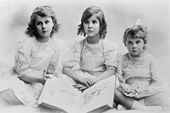Nicholas of Greece (1872–1938)
Nicholas, prince of Greece and Denmark - gr. Νικόλαος της Ελλάδας / Nikolaos tis Elladas - (born January 10, jul. / 22. January 1872 greg. In Athens , † 8. February 1938 ibid) from the house Schleswig-Holstein-Sonderburg -Glücksburg was a member of the Greek royal family .
Life
Nikolaus was born on January 22, 1872 as the fourth child and third son of the Greek King George I and his wife to the Russian Grand Duchess Olga Konstantinovna Romanova . As the grandson of the Danish King Christian IX. ( “Europe's father-in-law” ) and as the great-grandson of Russian Tsar Nicholas I, there were close family ties to both the Danish and the Russian ruling houses. In order to differentiate Nicholas from his cousin, the Russian heir to the throne, Nikolaus was called in family circles the "Greek Nicky".
Prince Nicholas received military training at the Hellenic Military Academy Scholi Evelpidon in Piraeus , and in his free time he devoted himself to painting . He signed his works with the abbreviation Nicolas Leprince .
Together with his brothers Konstantin and Georg, Nikolaus helped organize the Summer Olympics in Athens in 1896 and acted as president of the shooting competitions.
After the forced abdication of his brother Constantine I in June 1917, Nikolaus went into exile in Switzerland and later to France. There he accepted a professorship for painting. He did not return to Greece until 1936, where he died on February 8, 1938 and was buried in the Royal Tatoi Cemetery .
Marriage and offspring
On August 29, 1902, Nikolaus married the Russian Grand Duchess Jelena Vladimirovna Romanova , a second cousin in Tsarskoye Selo . She was the daughter of Vladimir Alexandrowitsch Romanow and his wife Marie zu Mecklenburg .
The marriage resulted in three daughters:
- Princess Olga (1903–1997) ⚭ 1923 Prince Paul of Yugoslavia
- Princess Elisabeth (1904–1955) ⚭ 1934 Karl Theodor Graf zu Toerring-Jettenbach
- Princess Marina (1906–1968) ⚭ 1934 George, 1st Duke of Kent
Web links
- Newspaper article about Nicholas of Greece in the 20th century press kit of the ZBW - Leibniz Information Center for Economics .
| personal data | |
|---|---|
| SURNAME | Nicholas of Greece |
| ALTERNATIVE NAMES | Nicholas of Greece and Denmark |
| BRIEF DESCRIPTION | Greek nobleman, Prince of Greece |
| DATE OF BIRTH | January 22, 1872 |
| PLACE OF BIRTH | Athens , Greece |
| DATE OF DEATH | February 8, 1938 |
| Place of death | Athens , Greece |

